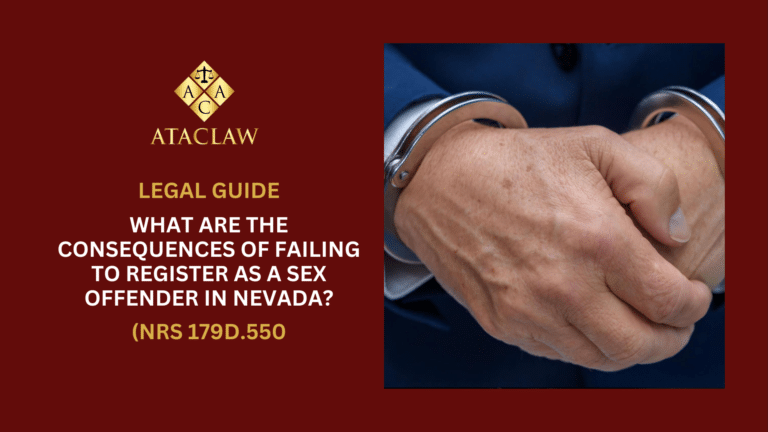In an era marked by stringent legal frameworks regarding sexual offenses, Nevada maintains clear statutes concerning the obligations of registered sex offenders. A critical aspect of these statutes is the requirement for offenders to register with local law enforcement, as outlined in Nevada Revised Statutes (NRS) 179D.550. But what happens when someone fails to meet this requirement? ATAC LAW delves into the legal implications and processes surrounding the failure to register as a sex offender in the Silver State.
Who is Required to Register as a Sex Offender in Nevada?
In Nevada, registration as a sex offender is mandated for individuals convicted of a wide range of offenses. These encompass a variety of crimes such as indecent exposure, sexual assault, child sex abuse, incest, and sex trafficking, among others. Convictions including certain types of murder, sexually-related dalliances between teachers and students, and even administering drugs with the intent to commit a sexual felony necessitate registration. Registration following a conviction not only satisfies a legal requirement but helps avoid the often severe consequences of non-compliance.
What are the Registration Duties for a Sex Offender in Nevada?
Once convicted, sex offenders in Nevada carry specific responsibilities. Foremost among these is the obligation to register within 48 hours of conviction or release from custody post-conviction. Additionally, any changes to personal information such as name, residence, address, employment, or student status must be reported promptly within the same 48-hour window. The law also demands that, if a stay in any jurisdiction exceeds the initially reported duration of less than 30 days, this must be reported immediately.
An annual verification form must be completed and accurate information must be provided to the Nevada Central Repository or a local law enforcement agency. Regular in-person appearances at a local law enforcement agency are also set out in the legislation. These appearances are tier-based: for Tier I offenders these occur once a year, for Tier II offenders every 180 days, and for Tier III offenders every 90 days.
Failure to comply with any of these conditions results in a felony charge in Nevada. It is noteworthy that Nevada law does not differentiate between intentional defiance and forgetfulness when it comes to registration. Notwithstanding, the court may issue lighter penalties if the offender had no deliberate intention to break the law.
What Steps Must Be Taken to Register as a Sex Offender in Nevada?
The process of registering as a sex offender in Nevada is guided by specific procedures which are generally explained by the court upon conviction. Here’s a broad overview on what you need to know about initial registration, changing your address, and fulfilling your annual verification obligations:
What is the Process for Initial Registration as a Sex Offender in Nevada?
As a newly convicted sex offender or upon release from incarceration, you have a mandate to register with your local police department within a 48-hour timeframe. For instance, if you receive your conviction in Las Vegas, you’d be expected to register with the Las Vegas Metropolitan Police Department. If you’re planning to spend over 48 hours in another city or county within Nevada, you must also register in that locality before the 48-hour window closes. To identify the appropriate local law enforcement office, you should visit the State of Nevada Department of Public Safety’s website.
How Do You Update Your Address as a Registered Sex Offender in Nevada?
Upon changing your residence, it’s imperative to notify the local law enforcement agency of your new address within 48 hours of the move. This applies whether the move is within the same city, to another county, or out of state. You’re obliged to inform both the law enforcement agency where you’ve been residing as well as the agency in your new locality.
The update may involve personal and professional details such as your name, place of employment, occupation, driver’s license number, residential address, and details of any vehicles you own or frequently use. For residents of Las Vegas, there might be an option to complete these updates online.
What Does Annual Verification Entail for Sex Offenders in Nevada?
Each year, you are required to confirm your details as part of your registration. You will receive a form from the Central Repository which you should fill out and return. The return packet should include your current fingerprints, a recent photograph, and any additional information that might be required.
For individuals residing in Las Vegas, there is a possibility to undertake some aspects of this annual verification process online.
What Happens if You Fail to Register as a Sex Offender for the First Time in Nevada?
A first-time failure to register is classified as a Category D felony. For individuals found guilty of this violation, the law stipulates:
A potential imprisonment term of 1 to 4 years
The possibility of fines reaching up to $5,000, subject to the judge’s decision
It’s important to note that the court has the discretion to offer probation instead of jail time for first offenders.
What are the Penalties for Repeated Failure to Register within a 7-Year Period?
Should you commit this offense a second time within seven years of your first, the charge escalates to a Category C felony. The consequences become more severe:
Imprisonment stretches from 1 to 5 years
Fines could ascend to $10,000, again at the judge’s decision
In cases of subsequent offenses, the option for probation is stripped away, indicating a stricter stance against repeat violations.
How Does the Intention Behind Failing to Register Affect the Sentencing?
The judiciary takes into account the motivation behind failing to register. An accidental oversight may result in a lighter sentence compared to a willful disregard of the registration obligations. This distinction showcases the system’s consideration of intent in the adjudication process.
What Additional Repercussions Exist for Violating Registration Requirements?
Beyond direct legal penalties, failure to register is categorized as a separate offense from the original sex crime, counting as a “strike” under Nevada’s habitual felon law. Accumulating three or more felonies can lead to enhanced penalties.
How Can You Defend Against Charges of Failing to Register as a Sex Offender?
Facing accusations under NRS 179D.550 for not registering as a sex offender can have serious implications. However, numerous defenses can be utilized to contest these charges. Here are some key strategies an attorney might employ:
1. Lack of Requirement to Register
Misunderstandings or miscommunications among governmental entities regarding registration mandates can lead to wrongful accusations.
2. Administrative Errors
The process of entering sex offender information into databases is prone to human error, sometimes resulting in wrongful arrests.
3. Wrongful Allegations
Prejudices can sometimes affect law enforcement personnel, leading to wrongful allegations.
4. Physical Incapacitation
Being physically unable to comply with registration requirements, such as due to a medical emergency, serves as a plausible defense.
Remember, facing such charges does not mean you’re without recourse. Armed with the defenses discussed above and professional legal help, you stand a fighting chance. So, don’t hesitate or try to navigate this complicated legal landscape alone. Reach out to us at ATAC Law. Our team of experienced attorneys specializes in sex offender registration laws, and we’re dedicated to advocating for you and defending your rights.




